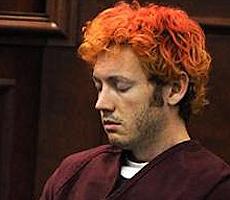Hollywood and box office terror
By Wes Pruden
PrudenPolitics.com
Hollywood is terrified of the backlash against the
movie violence that has become its stock-in-trade.
This time the big moguls, and some of the little
moguls, can see that the public is angry, but they
don’t know what to do about it.
Maybe the anger will go away. Once upon a time, the
moguls big and little had an ear for the music of
America, but the flesh-and-blood ear has turned to
tin. Some of the moguls can still occasionally
mumble the words, but they don’t recognize the
music.
All over Hollywood, the men and women who make the
movies are talking about the anger, frustration and
confusion in the wake of the Colorado massacre.
Rarely on the record, of course. They’re afraid of
suggesting a link between violence and the violent
images they project on the big screen (and on the
little screen in the corner of the living room). The
link, says one such executive, has not been
“empirically established.”
“And then there is this,” reports the Los Angeles
Times. “Violence is good for the box office. Talking
about corporate responsibility to tone down
on-screen aggression could leave executives open to
accusations of hypocrisy when they release their
next blood-soaked blockbuster.”
Hypocrisy in Hollywood? Who knew? Hypocrisy is the
black magic that links Hollywood and Washington, the
reason why the spinners at the dream factory and the
superintendents at the law factory see themselves
projected in each other. Harry Reid wants to be a
matinee idol and Martin Sheen gets to preside over
the West Wing.
But the dream factory is turning out more nightmares
than dreams, and some of the dream-weavers at first
thought they could see warnings written on the wall.
They were searching for what passes for “soul” in
Hollywood. “Like every person who works in the
movies and is following the event in Colorado,” says
Rob Cohen, director of several movies soaked in
gratuitous blood, “I’m asking myself what are we
responsible for, if anything.
“Some say we’re complicit in this violence and I’m
not sure we are. But it does give me great pause. We
want our movies to be shown to the widest possible
audience – we are in a commercial business – but now
I have to look deeper.”
Just not too deep. “Moral responsibility” – such as
it is measured in certain Hollywood precincts – is a
concept based not on the Bible, the Torah or other
ancient codes of right and wrong, but on the box
office. “The Dark Knight Rises” took in $161 million
in the first weekend after the massacre, good but
not great, and about $12 million less than expected.
That wasn’t scary enough to scare anybody straight,
but scary enough.
“Woke up to the news about the shooting,” one
writer-producer tweeted to his friends on the bloody
morning after. “This kinda thing always makes me
question my liberal use of violence in
storytelling.”
Harvey Weinstein, an independent producer who set
loose Quentin Tarantino on the public, suggested
that he, Mr. Tarantino and Martin Scorsese “sit down
and discuss our role in that.”
But these were vague promises of hope and change, of
no more substance than a lover’s promise in the
third reel of a soap opera, and as the sting of
accounts of massacre began to go away, so did the
idea that it may be time to do right. The box office
of “The Dark Knight Rises” has since recovered the
pace to set box office records, and so has rue and
resolve.
Frank Gibeau, a video game producer, likens his
mindless blood-and-guts games to cave paintings,
primitive animal hunts and even Homer’s Iliad. “But
it’s hard to imagine how someone can suggest that
the film playing that night in any way provoked this
horrible crime,” he says. “Rational people know the
difference between fantasy and real violence.”
Which is, of course, precisely the point. James
Holmes, charged with killing 12 men, women and even
children at the Century 16 Theater in Aurora, looks
none too rational, and his bright orange hair and
disguise as the Joker, the villain from the Batman
comics, shout loud and clear that he doesn’t
understand the difference between movie fantasy and
real life.

The only man responsible for the slayings in the
Colorado massacre is the man who pulled the trigger,
of course, but what’s hard to imagine is how anyone
could look at an entertainment culture amok in gore
and guts and not recognize the culture’s culpability
in madness. A few more massacres and maybe even
Hollywood will get it.
Wesley Pruden is editor emeritus of The Washington
Times.

